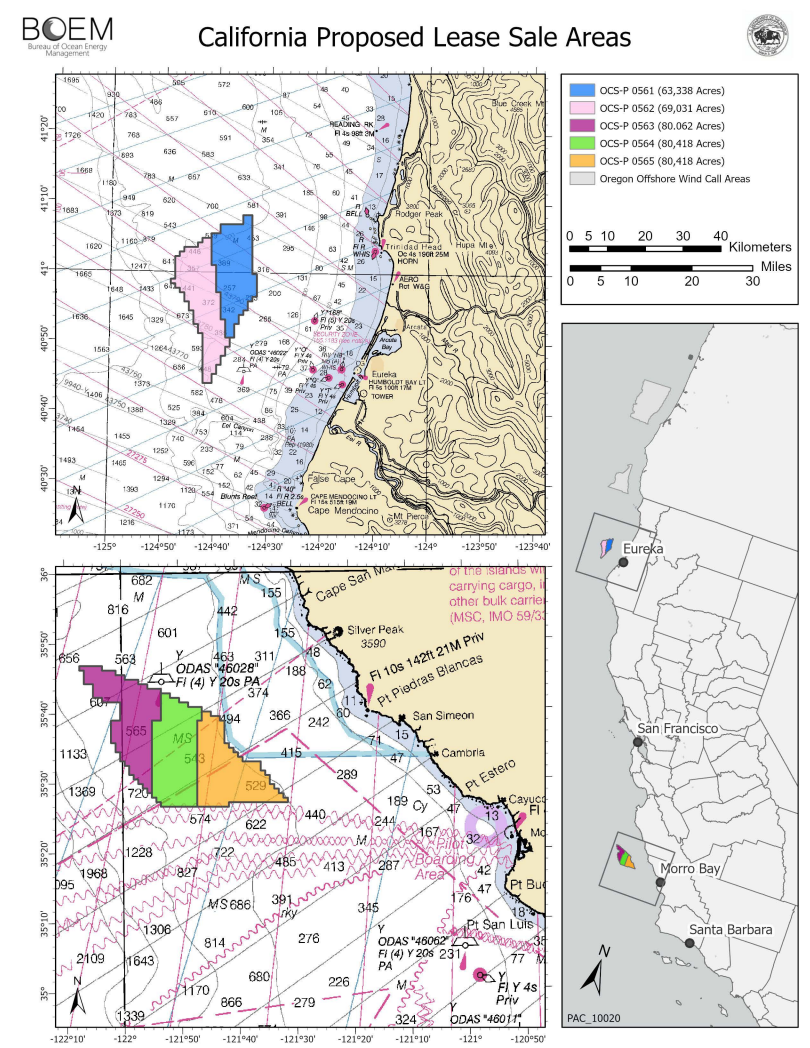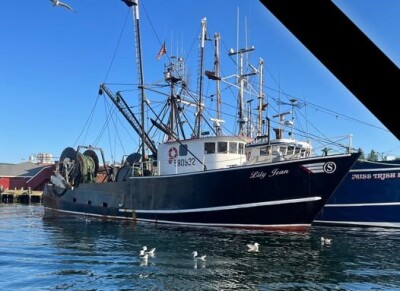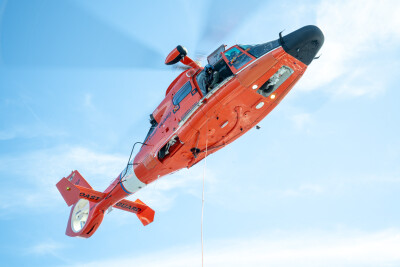Five areas totaling 373,268 acres off central and northern California are proposed by the Bureau of Ocean Energy Management for the first West Coast offshore wind energy lease auction.
The proposed sale notice, to be published May 31 in the Federal Register, will kick off a 60-day public comment period. Three lease areas are proposed for the Morro Bay wind energy area off the central cost and two in the northern Humboldt area.
“Today’s action represents tangible progress towards achieving the Administration’s vision for a clean energy future offshore California, while creating a domestic supply chain and good-paying union jobs,” said BOEM Director Amanda Lefton in announcing the plan. “BOEM is committed to robust stakeholder engagement and ensuring any offshore wind leasing is done in a manner that avoids or minimizes potential impacts to the ocean and ocean users.”
The first Pacific wind leases could open a new chapter in the nascent U.S. industry: Floating wind turbine installations. Deep waters off the West Coast will require developers to deploy floating technology that is still in relatively early stages of development in Europe.
California could push that development, said Liz Burdock, president and CEO of the non-profit industry group Business Network for Offshore Wind.
“Floating markets are advancing quickly in Asia and Europe creating a race to develop our own capabilities and position the U.S. as a global leader in this cutting-edge market,” said Burdock. “The Business Network congratulates President Biden’s and Governor Newsom’s administrations for this historic moment bringing offshore wind to the world’s fifth largest economy and taking necessary steps to set up a robust supply chain of domestic businesses that will elevate America as a frontrunner to an in-demand technology.
“Advancing offshore wind on the West Coast unlocks floating offshore turbine technology and will start a modern-day gold rush to revolutionize California’s energy sector with offshore wind development, a reliable, clean, and baseload renewable energy, in a state battling wildfires, droughts, and increasing energy demands.”
California Gov. Gavin Newsom’s administration has matched the Biden administration’s enthusiasm for offshore wind, but potential conflicts lurk with commercial fishing and other maritime uses, and environmental issues including marine mammals and endangered species.
In its lease proposal, BOEM is says it wants “several lease stipulations that will reaffirm its commitment to create good-paying union jobs and engage with Tribal governments, underserved communities, ocean users, and other stakeholders.”
According to BOEM those conditions could include:
• A 2.5 percent bidding credit to bidders who have executed or commit to executing a community benefit agreement with a community or ocean users, such as commercial fisheries, whose use of a lease area, or whose use of resources harvested from a lease area, is directly impacted by the lessee’s potential offshore wind energy development.
• A 20 percent bidding credit to bidders who commit to invest in programs that will advance U.S. offshore wind energy workforce training, supply chain development, or both.
• A requirement that lessees make every reasonable effort to enter into a project labor agreement covering the construction of any project proposed for the lease area.
• Requirements for lessees to engage with Tribes, underserved communities, ocean users, and agencies. Lessees will be required to report on their engagement and make reasonable efforts to implement their projects in a manner that minimizes and mitigates their projects’ adverse effects, if any, on these parties.
Since federal offshore wind leasing started in the Northeast, BOEM has held 10 competitive lease sales and has issued 25 active commercial offshore wind leases in the Atlantic Ocean from Massachusetts to North Carolina.







